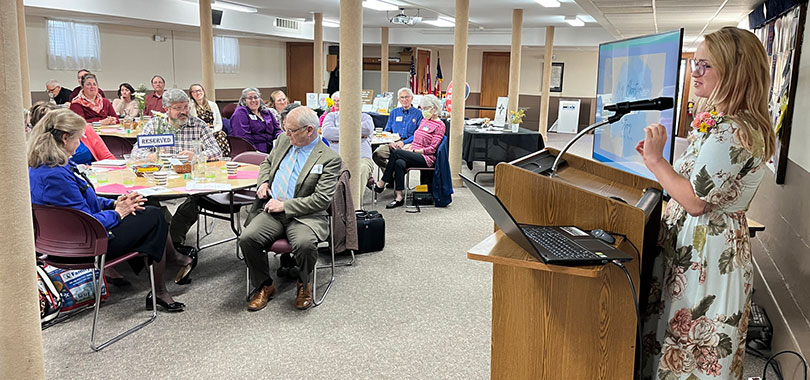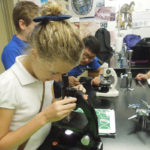
Sarah Hurm, right, shares her story during the Culture of Life Dinner April 19 at St. Wenceslaus Parish in Iowa City. She is the author of “Finding Hope: Letters to My Abortion Pill Reversal Baby.”
By Lindsay Steele
The Catholic Messenger
IOWA CITY — Sarah Hurm was at the lowest point in her life when she walked through the doors of Planned Parenthood for a medication abortion. “I was 26, on (government assistance) and I had just reconnected with a high school crush,” she told Culture of Life Dinner guests at St. Wenceslaus Parish last month. “In no time, I found myself pregnant.”
Hurm was already a single mother to three young children at the time. She worked in a physician’s office but struggled to make ends meet. “My immediate response was basically panic, then shame and guilt.” She hoped the father would offer words of support and encouragement; instead, he reinforced her deepest insecurities and encouraged her to “take care of it” by having an abortion. She knew her unborn child “was a person” but couldn’t shake what the father said.
The Clive, Iowa, native believed a medication abortion — which involves a series of prescription drugs — would be less traumatic and more discreet than a surgical abortion. As soon as she swallowed the first abortifacient pill at Planned Parenthood, “This weight hit me. I cried in my car” and wrote an apology letter to the unborn baby.
At home, Hurm searched the internet for a way to stop the abortion. She found a link to the Abortion Pill Reversal (APR) hotline and called the next morning. The APR receptionist connected her with Dr. Greg McKernan, a family physician in West Des Moines. “I didn’t need a promise (that it would work), just hope that it could,” she recalled.
Dr. McKernan prescribed a series of high-dose injections of progesterone to counteract the effects of the abortifacient. The unborn baby’s heartbeat began to normalize. A week later, Hurm told the father “the abortion didn’t work.” He pleaded for Hurm to try again but she stayed firm and refused. Isaiah Asher was born in January of 2019 and is a “free-spirited, intense spitfire” who has brought joy to his mother, siblings and extended family.
The experience strengthened Hurm’s Catholic faith and helped her heal from years of toxic relationship patterns. Now a published author and a motivational speaker, she shares her story of hope with anyone who will listen. “Planned Parenthood said it would empower me but it was actually Dr. McKernan and the abortion pill reversal,” Hurm said.
More than 120 adults attended the fundraiser at St. Wenceslaus to hear Hurm speak, a record number, said parishioner David Fetzer. The event generated $7,911 for St. Paul VI Institute FertilityCare Grants and Cycle Show grants.
FertilityCare grants help individuals who desire to become medical consultants or practitioners in the Creighton Model system of natural family care and family planning methods. The Creighton Model utilizes NaPro technology to identify and treat hormonal and gynecological problems without use of birth control pills. Its symptom-based fertility tracking method aims to help couples avoid or achieve pregnancy. Cycle Show grants help parishes to host an educational, interactive, multimedia fertility awareness workshop for preteen girls.
Dr. McKernan, a NaPro medical consultant since 2010 was among the speakers at last month’s fundraiser. He said medication abortion reversals are about 98% effective if started within 24-72 hours of taking the first pill, mifepristone, and if the second pill, misoprostol, has not been taken. His APR hotline participation has benefited his abortion reversal efforts. He has successfully reversed about 250 medication abortions, he said.
Over the past 10 years, 22 practitioners and two community educators who attended the dinners have received Culture of Life Dinner grants, Fetzer said. “Your donations really help to make a difference to help continue this kind of care in our community,” said Dr. Monica Minjeur, a past grant recipient who attended the dinner. “Your generosity has been wonderful,” Dr. McKernan said tearfully. “Give yourselves a hand.”











